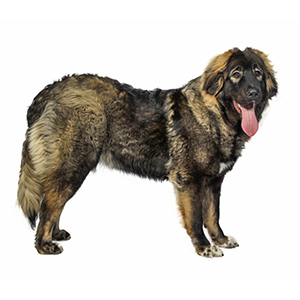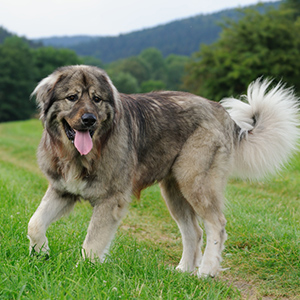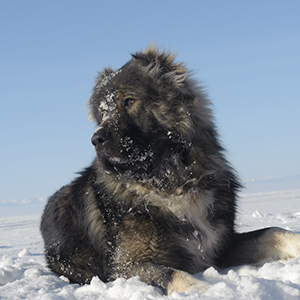
Caucasian Shepherd Dog
The fearless and intimidating Caucasian Shepherd Dog is loyal and loving to its family. It's a guardian dog at heart and can be fierce and, at times, aggressive when they feel a threat is present. Because of their large size, they need supervision around small kids; they're also better suited to larger areas where they can roam and explore.
Interested in discovering if your dog is a Caucasian Shepherd Dog?
Check out Wisdom Panel's DNA tests.

Caucasian Shepherd Dog Traits
General Appearance
This massive dog has a muscular build with a large head, oval eyes, and triangular ears. The Caucasian Shepherd Dog’s high-set tail is either sickle-curve or curled. And the breed has a straight, coarse, double coat that can be any length.
Coat and Colouring
The Caucasian Shepherd Dog has a double coat that is dense and thick and can be any length. The breed can be any color (except for solid black), piebald, or spotted.
Distinctive Physical Traits
The Caucasian Shepherd Dog's massive size is its most distinctive trait, with the dogs weighing more than 110 pounds for males and 100 pounds for the females. Despite such a large size, this breed is agile and free on its feet, with good stability and coordination.
Caucasian Shepherd Dog Temperament
This fearless breed requires proper training and socialization because they're highly territorial and protective, and can be wary of strangers. They make excellent guard dogs and are devoted and loyal to their people.


Caucasian Shepherd Dog History
The Caucasian Shepherd Dog—or Caucasian Ovcharka—hails from the Caucasus Mountains of Eastern Europe. Traditionally, Caucasian Shepherd Dogs guarded herds and protected the home.
Experts believe that this breed is a close relative of Asian mastiffs and sheepdogs of the Balkans. Historical accounts from the first century BC show that large dogs—resembling the Caucasian Shepherd Dog—worked as part of the Armenian Tsar's army.
In the 1920s, Caucasian Shepherd Dog breeding took off in earnest in the Union of Soviet Socialist Republics (USSR). There, Caucasian Shepherd Dogs became common thanks to their fearlessness and imposing physical appearance, as well as their excellent sight and hearing.
However, they didn't make their first appearance in Western Europe until the 1930s. The Caucasian Shepherd Dog became part of the American Kennel Club's Foundation Stock Service in 1996.
Caucasian Shepherd Dog Care
Nutrition
The Caucasian Shepherd is an extra-large breed. Because of their size, they require a well-proportioned and highly nutritious diet fit for their unique digestive needs and any additional health concerns.
It's important to monitor the amount of food and treats that you give your Caucasian Shepherd, especially since some dogs may be prone to gaining weight as they age. Your veterinarian is always a good source to help provide you with appropriate nutrition and feeding guidelines.
Grooming
The Caucasian Shepherd Dog can have a coat that's short, medium, or long, and the care required of their coat will vary depending on the individual dog.
For example, Caucasian Shepherd Dogs with long coats will need daily grooming, while dogs with medium-length or short coats might be able to get away with weekly brushing to prevent mats and remove loose fur.
All dogs require regular dental care, including at-home teeth brushing and professional dental cleanings, and the Caucasian Shepherd Dog is no exception. Maintaining good dental hygiene is important for their overall long-term health.
Exercise
The Caucasian Shepherd Dog isn't quite as active as some other Shepherd breeds, but they still require daily exercise—like walking or hiking—to keep them healthy and happy. Remember to keep this breed on a leash or in a fenced-in area whenever they are outside.
Training
The Caucasian Shepherd Dog can be friendly and loving, but proper care and socialization are essential to keep them from becoming unruly and aggressive. The breed's instinct is to protect their flock and the homes of their owners, and they can be very possessive and protective.
The Caucasian Shepherd Dog can be stubborn and independent, which often makes them harder—but not impossible—to train. Given their territorial and protective nature, you'll need to stay patient.
They aren't traditionally a good fit for a first-time dog owner, and their massive appearance can seem overwhelming to those who aren't sure how to handle them.

Breed Group
Middle Eastern and African
While this ancient group shares many of the characteristics of the Hound Group, their origins, as the name would suggest, are concentrated in Africa and the Middle East unlike the hound group that has no true geographic center.
Resources
https://www.akc.org/dog-breeds/caucasian-shepherd-dog/
https://wagwalking.com/breed/caucasian-mountain-dog
http://www.fci.be/Nomenclature/Standards/328g02-en.pdf
Reviewed 26 July 2020 by Cindy Elston, DVM, MPH




















